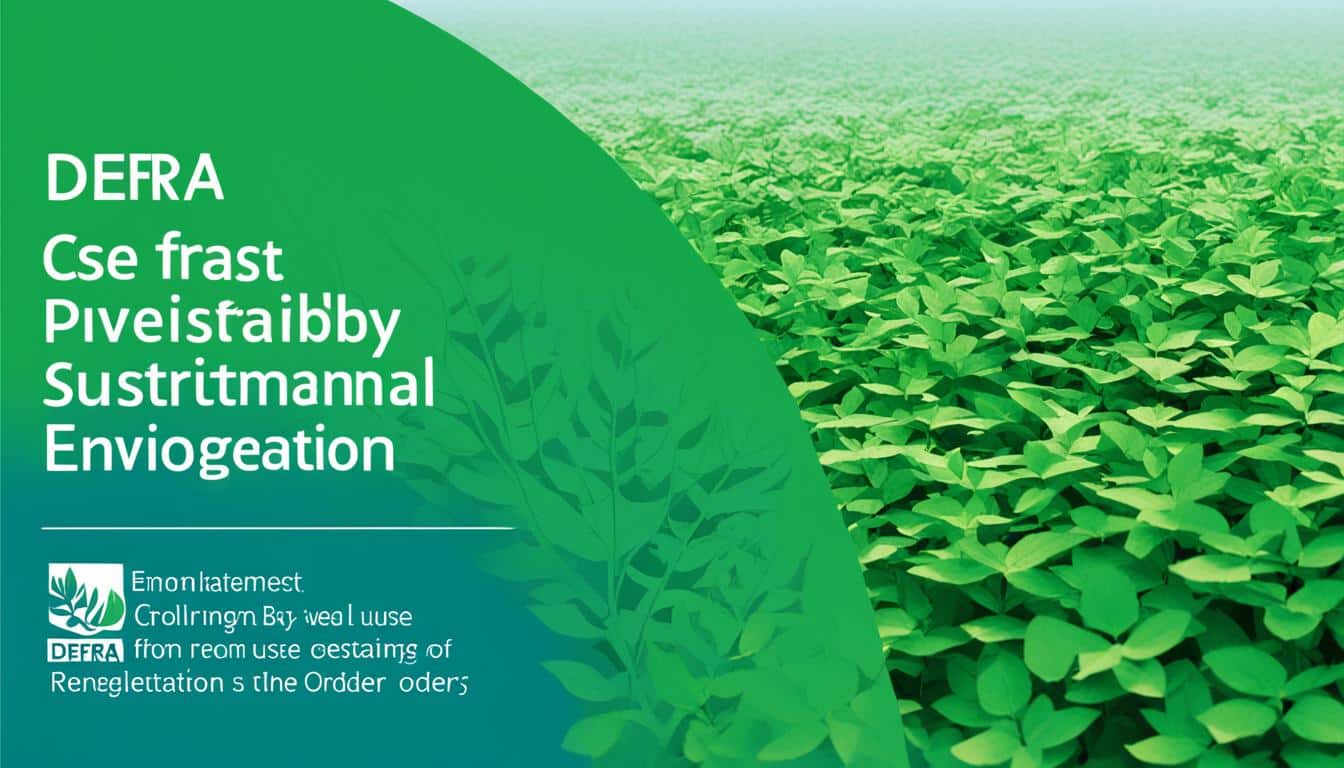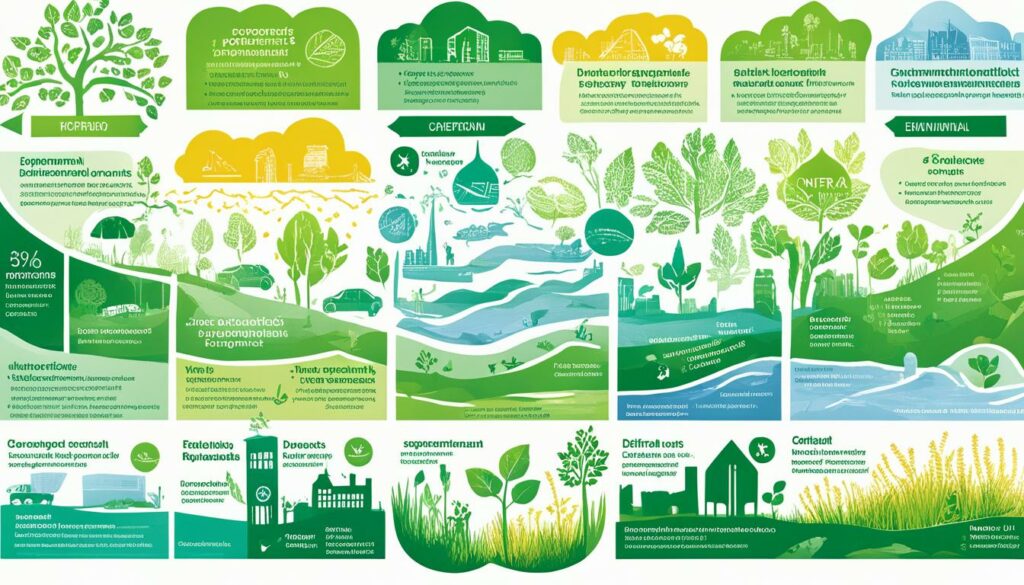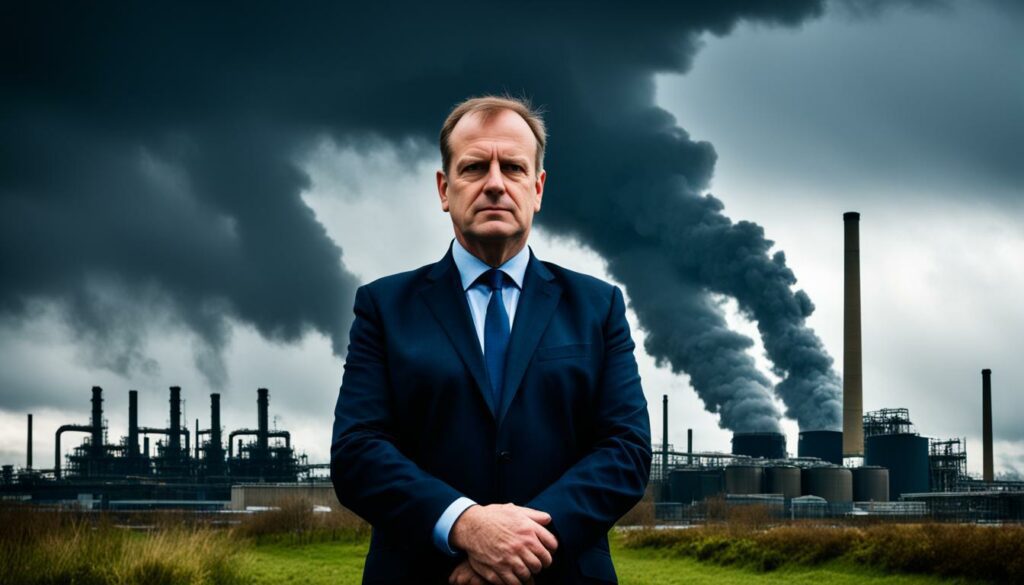Menu

DEFRA’s focus is on protecting England’s environment by enforcing strict rules. This job is all about making sure people follow these rules. If not, they will face penalties and have to fix any harm they caused.
But DEFRA doesn’t just punish those who break the rules. It also works to make sure everyone knows and respects the environment laws. This way, it helps keep England’s surroundings clean and safe. The agency does this by holding everyone to the same fair and clear standards, including strict penalties for serious violations.
The DEFRA, or Department for Environment, Food and Rural Affairs, is crucial for England’s future. It focuses on environmental policies that protect the earth for tomorrow. DEFRA’s goal is to improve air quality, clean water, and green spaces.
DEFRA aims to make the environment better and safer. It works on projects to reduce pollution and increase plant and animal life. By using data and research, we make sure our actions help the environment and the economy.
Collaboration in environmental regulation with key groups is vital. DEFRA teams up with the Environment Agency and others to enforce green rules. Our over 10,250 employees and working with other countries in the UK help reach our goals.
| Agency | Role |
|---|---|
| Environment Agency | Regulates and enforces environmental laws |
| Natural England | Conserves and enhances the natural environment |
| Joint Nature Conservation Committee (JNCC) | Advises on UK-wide and international nature conservation |
| Rural Payments Agency | Supports sustainable farming and rural communities |
DEFRA is all about sustainable practices. It leads us to a better, greener future. Working with experts and bodies lets us make strong plans.
DEFRA works hard to ensure environmental laws are followed well. The Environment Agency is part of this effort. It focuses on four main goals. These goals are all about keeping our environment safe and healthy. By focusing on these, they try to stop bad environmental actions before they happen.

The first aim is to quickly stop bad environmental actions. The agency uses strong watch and report systems to catch and fix problems fast. This helps protect nature and people.
Fighting damage caused by these actions comes second. Offenders are made to clean up or fix what they’ve harmed. This work not only helps right away but also makes nature better for the future.
Next, making sure everyone plays by the rules is key. DEFRA helps businesses and people understand and follow the law. They teach, advise, and check to make sure everyone does their part. They want to build a world where we all care for the planet.
Lastly, DEFRA tries to keep problems from happening again. They can give fines or take legal action. This warns others not to break the rules. It helps keep nature laws strong and respected.
DEFRA keeps the environment safe by having strong rules. These rules make sure everyone is treated fairly when enforcing them. The Environment Agency ensures this happens fairly.
DEFRA acts fairly by matching its response to how big the problem is. This means they look at the danger to the environment and how bad the offence is. They also think about the cost versus the good done for the environment.
So, their actions are not too much or too little. DEFRA tries to make their work do the most good. This way, they meet laws and what people expect from them.
DEFRA treats similar offences the same way. This makes sure everyone follows the rules equally. It makes the competition fair and helps stop people from breaking the rules. Following this rule also makes DEFRA’s work more trusted and respected.
DEFRA believes in sharing how they work openly. They tell businesses and the public what they must do and why. This helps everyone understand and follow the rules better.
Being clear and open helps gain trust. It also makes sure everyone knows and respects the rules for protecting the environment.
DEFRA focuses on places and actions that could really hurt the environment. They work by strict standards to stop crime and mean serious problems. They want to protect the environment and encourage doing things in better ways.
DEFRA is key in looking after the UK’s environmental rules. They make strict rules to keep our water, air, and land safe. These standards help the UK cut down on pollution and save different plants and animals. DEFRA also helps businesses use methods that are good for both the environment and the economy.

DEFRA carefully crafts rules to protect the UK’s nature. They have over 10,250 staff who work hard to clean the air and water, cut down on waste, and save plants and animals. DEFRA wants to lower the harmful gases we release and increase nature’s ability to absorb these gases. They focus on areas like farming, waste handling, and planting trees in peat areas.
DEFRA also puts UK environmental rules into action. They work closely with the governments in Wales, Scotland, and Northern Ireland to do this. Together, they make sure different industries like farming, fishing, and making food follow the law and do things that help the planet and the economy. Their teamwork creates plans that make the environment and businesses stronger.
| Statistic | Details |
|---|---|
| Employees | 10,250 full-time equivalents as of December 2020 |
| Collaboration | Works with devolved administrations in Wales, Scotland, Northern Ireland |
| Key Focus Areas | Cleaner air and water, waste reduction, biodiversity conservation |
| Net Zero Emissions | Reduce greenhouse gas emissions, enhance carbon storage |
DEFRA leads in environmental policy with open and honest work. They share lots of information, like how many staff they have and what they earn. This makes people trust them more and shows how much they care about doing a great job with the environment and following the UK’s rules.
An environmental management system (EMS) is key for any organisation wanting to handle environmental duties well. With an EMS, firms can meet environmental rules and grow. They work on environmental improvement strategies.
Having a good EMS helps spot and cut down on environmental risks. The EMS includes parts that match the risk in the firm’s work. For instance, firms with environmental permits need clear plans to reduce pollution. This includes plans for things like water discharge and waste storage. Larger sites might need to follow specific ISO standards like ISO 14001:2015.
Being compliant with environmental policy means using the system as soon as you get a permit. Following the rules boosts a firm’s reputation. This might mean less checking from the Environment Agency. Continuous growth is crucial for every EMS. ISO standards set a path for better environmental care. Using these systems boosts trust and keeps firms in line.
Sectors like manufacturing and mining benefit from standards supported by DEFRA. These can lead to big wins for the environment and the firms’ operations.
| ISO Standard | Application | Key Benefits |
|---|---|---|
| ISO 14001:2015 | General Environmental Management | Compliance, Risk Management, Continual Improvement |
| ISO 50001:2018 | Energy Management | Energy Performance, Reduced Emissions |
| ISO 14064-1:2018 | GHG Emissions Quantification | Transparency, Accountability, Reporting |
A great environmental management system shows a deep caring for doing the right thing. It ensures firms not only follow legal rules but also help the planet a lot.
The impact of government regulations on environmental practices is crucial. DEFRA uses a regulatory framework to enforce environmental laws. This framework is crafted to keep businesses going while protecting our planet.
DEFRA sets out laws in acts like the Environment Act 2021. This Act lets DEFRA make sure businesses and the government meet targets for things like air and water quality. The Office for Environmental Protection helps keep everyone in check.
It also changes how businesses and groups report their data. The aim is to do better for our environment. For example, reducing particulate matter in the air will make people healthier. This could save the country a lot of money every year.
The impact of government regulations hits both businesses and the world around us. New rules make it simpler for businesses to follow and report on their environmental efforts. A recent public talk about future goals heard what businesses and groups had to say.
Reducing particulate matter in the air by 2040 is a key goal. It will help lower pollution and make us all healthier. Experts say this could save the country a lot of money yearly.
The Royal College of Physicians estimated the social cost of air pollution to be over £20 billion annually.

| Key Element | Details |
|---|---|
| Reduction Target | Fine Particulate Matter (PM2.5) to 10 micrograms per cubic metre by 2040 |
| Public Consultation Period | Extended until 27th June 2022 |
| Economic Impact | Estimated by the Royal College of Physicians to be over £20 billion annually |
| Key Assumptions | Business population affected, time savings, use of external advice on compliance |
The enforcement of environmental laws affects both businesses and the health of our planet. DEFRA’s rules shake things up for the better.
It’s crucial to follow environmental compliance strategies. They help protect nature and promote sustainable growth. Achieving these goals needs everyone to join in, including businesses, communities, and each person.
Businesses are vital in keeping the environment safe. They should follow strict rules and use sustainable methods. For example, they should comply with marine rules and manage their quotas, all checked by the MMO.
Moreover, it’s key for businesses to show they work openly and responsibly. This ensures they protect public health and marine life. By doing so, they help our environment stay healthy.
Communities must also take part in protecting the environment. People can help by getting involved in local projects and following environmental laws. This way, they support the work of the MMO and help stop illegal fishing.
Furthermore, everyone plays a vital part in looking after special nature areas. Their effort makes sure these places stay great for plants and animals. Together, we can make sure our environmental rules are followed.
| Compliance Area | Strategies | Impact |
|---|---|---|
| Marine Licensing | Adhere to regulatory guidelines | Reduced environmental impact |
| Fisheries Monitoring | Implement quota management | Sustainable fishing practices |
| Illegal Fishing (IUU) | Community reporting | Decreased illegal activities |
| SSSI Management | Community involvement | Improved ecological conditions |
By taking active roles and responsibilities, all of us can contribute to a better, greener future. Every small effort counts, from businesses to individuals and local communities.
Fixed penalty notices are a key tool for enforcing environmental laws. They offer a quick way to deal with small offences. This means people don’t need to go to court for every little thing. The Clean Neighbourhoods and Environment Act 2005 made it so that more groups can give these notices. They can now set fines that match their local area’s needs.

The rules for fixed penalty notices are set in two Acts from 2006. These Acts show how important these notices are. They help stop small environmental crimes in a clear and effective way.
Many people think these notices are a good way to solve real problems without being too harsh. I believe they should be part of a bigger plan to stop environmental crime.
It’s really important that those giving out these notices are well trained and have the right evidence. They must choose the right fine for each case of littering or waste. Small cases get a fine, but bigger ones might need to go to court.
In London, special rules mean councils can fine the owner of a car if someone throws litter from it. This shows how fixed penalty notices can be tailored to different places and situations.
Getting a discount for paying early makes these notices even more useful. DEFRA is thinking about raising the fines for some environmental crimes. This shows how important these notices are for protecting the environment.
| Offence | Maximum Fixed Penalty (2023) | Discount for Early Payment |
|---|---|---|
| Graffiti | £500 | 40% |
| Flyposting | £500 | 40% |
| Littering | £500 | 40% |
| Household waste duty of care | £600 | 40% |
| Fly-tipping | £1,000 | 40% |
In the end, fixed penalty notices are a quick and cheap way to handle minor environmental issues. They meet the public’s expectations while supporting the goals of DEFRA. By using these notices well, DEFRA strengthens its power to fight against small environmental crimes.
DEFRA is very important for the UK’s environmental safety. It looks after crucial laws that protect our nature. These laws change over time as we learn more about the environment. They are constantly updated to tackle new problems and use new scientific knowledge.
DEFRA makes sure laws in the UK prevent harm to our natural world. For instance, the Environmental Permitting Regulations tell us how to deal with waste and pollution. These rules are key for keeping nature healthy and people safe. DEFRA also made it a rule on 26th February 2024 that certain XL Bully dogs must be registered and fixed. This decision shows DEFRA works hard to stop diseases from spreading.
DEFRA is always updating its important rules to save our environment. For example, on 18th May 2024, the UK gave councils £1 million to fight illegal dumping. This money helps protect our land. Also, starting 22nd April 2024, it became illegal to sell wet wipes with plastic.
This effort is a big win for our environment. On 7th May 2024, there were concerns about a new virus potentially harming animals in the UK. This news led DEFRA to give out new advice and steps to take.
DEFRA keeps bird owners and everyone up to date on bird flu risks. This ongoing work helps everyone respond quickly. By updating and improving laws regularly, DEFRA protects our environment better. This makes sure UK environmental laws work well to keep nature safe.
DEFRA plays a key part in making sure that rules on climate change are followed. They use climate change fines to punish those who break the law. These fines aim to make companies and groups change how they do things.

DEFRA’s climate change fines aim to stop harmful activities. They are a big part of DEFRA’s plan. By charging big fines for breaking the rules, DEFRA makes sure it’s not worth the risk. For example, they target nitrous oxide because it’s very harmful.
DEFRA’s fines have a big impact on the country’s environment plan. These actions show the UK is serious about cutting greenhouse gas emissions. They also help companies follow the rules and move towards a greener way of working. This protects our water, air, and land.
DEFRA’s work goes beyond just giving out fines. It pushes companies to be more eco-friendly. This helps the UK reach its environmental goals and cuts future harm to the planet.
| Statistic | Value | Implication |
|---|---|---|
| Percentage of England classified as vulnerable to nitrogen run-off | Over 50% | Increased risk of nitrogen-related pollution |
| Warming potential of nitrous oxide compared to CO2 | 300 times | Significant target for regulatory actions |
| Nitrogen-sensitive habitats exceeding recommended levels | 60% | Direct concern for DEFRA’s climate enforcement |
| Healthy rivers in the UK | 14% | Major focus for improving water quality |
| Groundwater for drinking requiring treatment due to high nitrate levels | Nearly a third | Need for stringent climate change penalties |
| English lakes not meeting good status in terms of nitrogen levels | Over 50% | Critical area for DEFRA’s environmental policy |
| Hidden environmental costs for every dollar in agricultural value | $2 | Cost attributed largely to nitrogen use |
| Time frame to halve nutrient waste according to COP15 | Less than 7 years | Urgency in implementing climate change penalties |
The DEFRA sanction principles guide how the Environment Agency enforces English environmental laws. They help deter violations and encourage following the rules. These principles also aim to repair any harm to the environment.
DEFRA’s key goal is to change how people act regarding environmental rules. It does this by giving fitting penalties for each mistake. DEFRA wants to stop these mistakes from happening again. It does this by creating a culture where following the law is a constant effort.
The money side of the DEFRA penalties is really important. The penalties are made to take away the profit from breaking the rules. This means punishing wrongdoers and showing that breaking environmental laws costs more than it’s worth. Right now, fines can be up to £250,000. There are plans to make this even higher. This is to make sure people take the rules seriously.
Here’s a quick look at how DEFRA’s enforcement work breaks down each year:
| Action | Quantity Annually |
|---|---|
| Enforcement Actions | 3.6 million |
| Inspections | 2.8 million |
| Warning Letters | 400,000 |
| Formal Cautions | 3,400 |
| Statutory Notices | 145,000 |
| Prosecutions | 25,000 |
DEFRA is committed to promoting environmental health through fair enforcement. The use of penalties inspires people to comply and change their behaviour.
DEFRA works under a detailed legal framework to make sure environmental rules are followed. The European Union (Withdrawal) Act 2018 is a key law that came into effect on June 26, 2018. It says the Secretary of State must publish new laws about the environment within six months.
DEFRA has many important laws and rules for the environment. For example, there’s the Environmental Civil Sanctions (England) Order 2010 and the Environmental Permitting (England and Wales) Regulations 2016. These give DEFRA clear powers to make sure rules are followed well.
The new laws will set up a special group to check that everyone, including government ministers, follows the environmental rules. This makes sure there is better oversight and enforcement. DEFRA is asking for people’s opinions on these laws. They want to include environmental rules in our laws and policies, especially after Brexit.
People in England and officials are being asked to give feedback on these rules. DEFRA will share a summary of what people said on its website. They will keep everyone’s comments public, but personal details will be kept private. This new law aims to make DEFRA’s work stronger, so our environment is protected very well.
DEFRA looks after England’s environmental rules. They keep out things that can hurt nature. They make sure people fix any harm done and follow the law. Their work also aims to stop further harm from happening.
DEFRA wants to make the environment better for those who come after us. For this, they protect the air, water, and the green places. Their goal is to leave a richer environment for the next generation.
DEFRA works with many groups like the Environment Agency. Together, they make sure everyone follows the environmental rules. They help the environment stay healthy while the economy grows. They do this by working closely and sharing goals.
DEFRA tries to do several important things with its enforcement. They stop bad activities that harm the environment. They also make sure the land gets better after any harm. Plus, they push bad actors to follow the law and keep the environment safe.
In dealing with rule-breakers, DEFRA is fair but firm. This means they treat everyone equally. Their actions are based on how bad the rule-breaking is. And they make their actions clear so everyone knows what’s expected.
DEFRA leads in setting rules for clean water, air, and land. They make sure companies keep the environment in mind. This is a big step in keeping our world both green and growing.
An EMS is a system to help groups lower their impact on nature. DEFRA supports it to make sure companies follow the rules and get better over time. It’s all about keeping the earth safe while growing responsibly.
Government rules by DEFRA make sure companies don’t hurt nature. They make the business field fair for everyone. The rules also correct any damage already done to the environment.
DEFRA encourages both businesses and communities to work in eco-friendly ways. They believe everyone should help protect the earth. By working together, we can achieve common green goals.
Fixed penalty notices are like quick fines for small environmental crimes. The Environment Agency can issue them without a big legal process. They help stop bad behaviour right away.
Important rules include the Environmental Permitting Regulations. There’s also the Environmental Civil Sanctions Order. These laws are key for protecting the environment. They get updated to match new challenges and knowledge.
DEFRA and groups like the Environment Agency use fines to make sure people follow climate rules. These fines can change behaviour and support national climate goals. They aim to encourage actions that fight climate change.
DEFRA’s fines aim to change how people act and remove any financial gain from breaking the law. The size of the fine matches the seriousness of the crime and the damage to nature. They’re meant to stop future harm and fix any current issues.
DEFRA is backed by laws like the Environmental Civil Sanctions Order. They ensure the environmental laws are strict but fair. These laws give DEFRA the power to protect nature effectively.